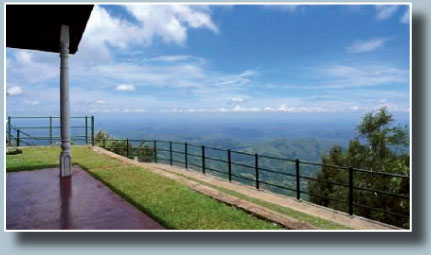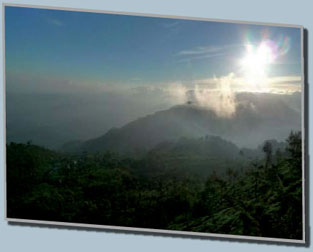

Snugly located about 193 km away
from the city making it a 4-hour drive on the Colombo-Kandy - Nanu
Oya-Badulla Road and railway line, is where the happy town of Haputale
is, at an elevation of 1,579 m (4,736 ft).
 Overlooking a heavenly mountain ridge of the southern edge of the
Central Highlands, Haputale is one of the most spectacular townships of
Sri Lanka.Haputale’s high elevation offers a stunning bird’s eye view to
the north and the south. Towards the southern side are plains that
tumble near the coast. To the northern section are green hills making up
the rest of the beautiful highlands. Overlooking a heavenly mountain ridge of the southern edge of the
Central Highlands, Haputale is one of the most spectacular townships of
Sri Lanka.Haputale’s high elevation offers a stunning bird’s eye view to
the north and the south. Towards the southern side are plains that
tumble near the coast. To the northern section are green hills making up
the rest of the beautiful highlands.
The Haputale Gap is one of the places that offer breathtaking views
in the country. The great amphitheatre of the upper Uva spreads out to
the North and East. It is surrounded by the mountains of Idalgashinna,
Ohiya and the Horton Plains National Park, the peaks of Hakgala (Hakgala
Botanical Gardens is located there), the purple cone of Namunukula and
Poonagala and Nuwara Eliya. On the other side is an equally breathtaking
view and the foothills of the lower Uva, the southern Sabaragamuwa
followed by Southern Province right down to the sea. On a bright and
cloudless day, one could see the ocean as a bright blue line in the
distance, disclosing the stabbing rays of the little lighthouse of
Hambantota, far south.
The highlight of a nature trek is the tranquil Lipton’s Seat bringing
in a panoramic view that sweeps you off the feet. While hiking you
wouldn’t miss the famous tea factory, old country mansion of Adhisham
and Diyaluma Falls.
A little way off the town, some of the tea plantations are geared to
welcome the tourists. The colonial heritage of Ceylon is brought to life
by St. Andrew’s, neo-Gothic church located just north of the town along
the main road Haputale-Bandarawela. The graveyard of the church takes
solace in providing the final resting places to the illustrious British
tea planters.
 The Benedictine monastery of Addisham is a few kilometres from
Haputale. The sign at the main gate reads ‘Silence is Golden’, a golden
saying hardly adhered by the million mutinies of the modern world devoid
of collective responsibility yet clamouring for individual rights. The Benedictine monastery of Addisham is a few kilometres from
Haputale. The sign at the main gate reads ‘Silence is Golden’, a golden
saying hardly adhered by the million mutinies of the modern world devoid
of collective responsibility yet clamouring for individual rights.
The old colonial British planters’ bungalow was converted into a
monastery by an industrious team of monks with tons of stonework. The
original bungalow was built by a Kentish gentleman, who having filled it
with imported carpets, porcelain, furniture and glassware, even had an
English chauffeur brought in for his Daimler.
Today the monastery runs a domestic industry of food products such as
jams and jellies from guavas and fruit cordials. The monastery bordering
the Tangamalai bird sanctuary, the garden is home to blue magpies,
paradise flycatchers, green barbets, brilliant orange plumaged mini-verts
hornbills, golden orioles and a host of other bird life.
Pix: Indi Samarajiva
|

